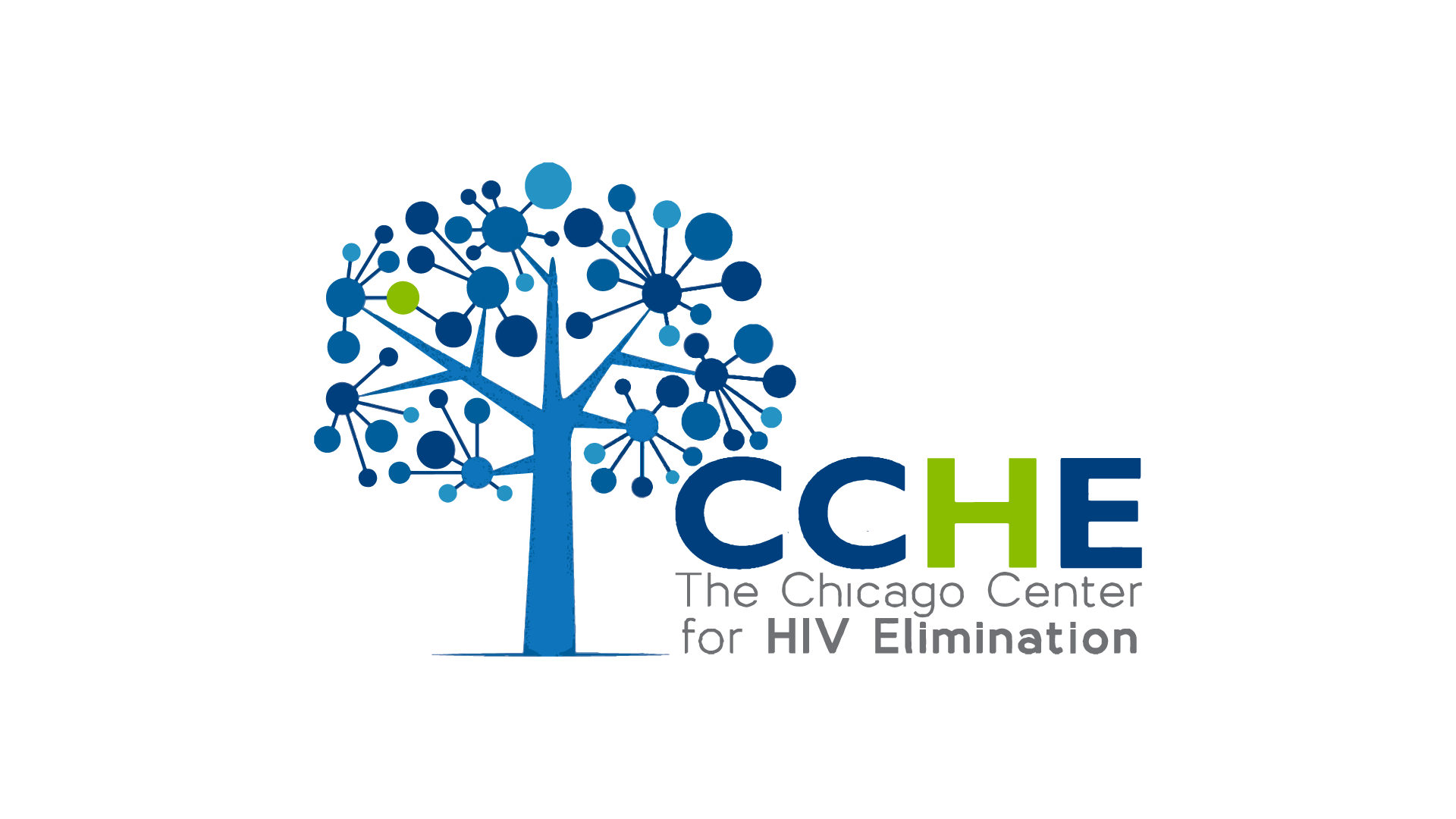Research
Our Research
The Chicago Center for HIV Elimination (CCHE) mission is to eliminate new HIV transmission events over the next 30 years (from 2011 to 2041) using innovative strategies that integrate research, prevention, outreach, and practice to reach those who are most vulnerable and affected by HIV, namely Black sexual and gender minorities (BSGM). CCHE’s location within the University of Chicago allows us to move smoothly between research, public health, community intervention, and clinical practice. We combine research and service which allows for efficient bidirectional translation – research directly informs our practice and our practice informs the research. Through innovative research strategies including social network science, CCHE researchers and staff continue to inform practice while learning from research to address barriers to access, prevention, care and treatment to healthcare for the communities served.
Our current research includes studies in pre-exposure prophylaxis, long-acting injectable antiretroviral therapy, linkage to HIV care and treatment, COVID-19 testing and vaccination, anal cancer prevention and substance use disorder treatment.
Interested in participating? Follow this QR code!
COMMUNITY NETWORK DRIVEN COVID-19 TESTING AND VACCINATION AMONG MOST VULNERABLE POPULATIONS IN THE CENTRAL UNITED STATES (C3 – PHASE I)
Lead Investigators:
John Schneider, MD, MPH (University of Chicago)
Kavita Bhavan, MD, MHS (University of Texas, South Western)
Jerome Montgomery, MBA, MS (Project Vida, Chicago, IL)
Sponsor: NIH
Introduction:
This C3 project, “Community network-driven COVID-19 testing of vulnerable populations in the Central US”, is implementing and evaluating a COVID-19 testing approach that combines an evidence-based Social Network Testing Strategy (SNS) with community developed COVID-19 public health messages (SNS+). C3 engages two disenfranchised populations across rural and urban sites in states across the Central US (TX, LA, AR, IN, IL). The scientific premise of C3 is to engage disenfranchised people in COVID-19 testing and vaccination through social network referral combined with theory-driven COVID-19 prevention messaging.
SOCIAL NETWORK DIFFUSION OF COVID-19 PREVENTION FOR DIVERSE CRIMINAL LEGAL INVOLVED COMMUNITIES (C3 – PHASE II)
Lead Investigators:
John Schneider, MD, MPH (University of Chicago)
Russell Brewer, DrPH, MPH (University of Chicago)
Sponsor: NIH
Introduction:
The “Social network diffusion of COVID-19 prevention for diverse Criminal Legal Involved Communities”, will implement a situation appropriate COVID-19 testing and vaccination social network diffusion intervention – C3 Phase II. C3 Phase II builds upon C3 Phase I, by using a network diffusion approach facilitated through motivational interviewing purposefully geared to mobilize one’s own organic social network to increase situation appropriate testing and vaccine uptake.
N2 - PREP UPTAKE AND ADHERENCE AMONG YOUNG BLACK MSM: NEIGHBORHOOD AND NETWORK DETERMINANTS (LONGITUDINAL COHORT - BEHAVIORAL)
Lead Investigators:
John Schneider, MD, MPH (University of Chicago)
Duncan Dustin, ScD, ScM (Columbia University)
Justin Knox, PhD, MPH, MSc (Columbia University)
Sponsor: Columbia University
Introduction:
“PrEP Uptake and Adherence Among Young Black MSM: Neighborhood and Network Determinants” (N2) is a behavioral study. This study aims to determine the relationship between neighborhood-level factors and pre-exposure prophylaxis (PrEP) uptake and adherence; characterize the relationship between social and sexual network characteristics and PrEP uptake and adherence; and identify interactive effects of neighborhoods and social and sexual networks on PrEP uptake and adherence.
The N2 Cannabis PrEP Study uses innovative methods to rigorously investigate relationships between cannabis use (including polysubstance use), HIV prevention behaviors (e.g., PrEP use/adherence) and biological vulnerability to HIV infection among an existing cohort of Black men who have sex with men (MSM).
The N2 Stimulant Study characterizes stimulant use in the N2 cohort, including use of other drugs (i.e. polysubstance use), and patterns of use over time (e.g., incidence, persistence); identifies network-level and neighborhood-level determinants of stimulant use; and determines how stimulant use impacts HIV transmission through prevention (e.g. PrEP adherence, condom use), treatment (e.g. ART adherence) and amplified biological vulnerability (i.e. rectal inflammation).
DETERMINING THE ACCURACY OF SELF- AND PARTNER ANAL EXAMS FOR DETECTING ANAL ABNORMALITIES (PREVENT ANAL CANCER (PAC) PALPATION STUDY)
Lead Investigators:
Aniruddha Hazra, MD (University of Chicago)
(University of Chicago)
Sponsor: Medical College of Wisconsin (MCW)
Introduction:
Anal cancer is a common cancer among gay, bisexual and other men having sex with men (MSM). Its annual incidence is approximately 50-fold and 5-fold higher among HIV-positive MSM and HIV-negative MSM, respectively, compared to the rest of the general population.
The long-term goal of the Prevent Anal Cancer (PAC) Palpation Study is to decrease morbidity and mortality from anal cancer by increasing detection of anal canal tumors through self- or partner-palpation of the anal canal.
UNDERSTANDING PATIENT, PROVIDER, AND SYSTEMS STAKEHOLDER ATTITUDES AND PREFERENCES TO OPTIMIZE IMPLEMENTATION OF LONG-ACTING INJECTABLE ANTIRETROVIRALS AND MAXIMIZE CLINICAL AND PUBLIC HEALTH IMPACT
Lead Investigators:
Moira McNulty, MD, MS (University of Chicago)
John Schneider, MD, MPH (University of Chicago)
Katerina Christopoulos, MD, MPH (UCSF)
Sponsor: NIH/NIMH
Introduction:
Long-acting injectable antiretroviral therapy (LAI-ART) represents the next innovation in HIV therapy. To realize the potential of LAI-ART, the scientific community must anticipate, understand, and address barriers and bottlenecks to implementation. The goal of the LAI-ART study is to identify LAI-ART implementation strategies across patient, provider, and clinic/systems contexts using a mixed-methods, multi-level study structured by the Consolidated Framework for Implementation Research (CFIR) with the goal of creating a care delivery model that optimizes real world use.
STI/HIV PREVENTION FOR BLACK SEXUAL MINORITY MEN AND TRANSGENDER PEOPLE
Lead Investigators:
Russell Brewer, DrPH, MPH (University of Chicago)
Maria R Khan, PhD, MPH (New York University)
Sponsor: NIH/NIDA
Introduction:
The purpose of this study is to understand barriers and facilitators to implement STI/HIV prevention among Black sexual minority men (BSMM) and transgender people who have been involved in the criminal justice system, their health care providers and researchers studying these populations.
To improve our understanding of how to best reach and engage BSMM/TGW during re-entry in STI/HIV prevention, this study is a three site (NYC, Chicago, Central NC) qualitative pilot study to identify the community organizations where BSMM/TGW with criminal justice involvement (CJI) can best be reached, the most feasible and acceptable methods of assessing a history of CJI in community care and service organizations to reach the population with STI/HIV prevention, and the most acceptable methods of engaging BSMM/TGW with CJI in care and research. We aim to identify shared and site-specific differences in intervention settings and approaches.
Harnessing Social Network Support to Improve Retention in Care and Viral Suppression among Young Black Men in Chicago and Alabama: A Hybrid Type I Effectiveness-Implementation Trial of Project nGage
Lead Investigators:
Alida Bouris, PhD, MSW (University of Chicago)
Scott Batey, PhD, MSW (University of Alabama)
Sponsor: NIH
Introduction:
Project nGage is an evidence-based intervention leveraging organic social support in the lives of young Black sexual minority men with HIV. In a prior study of Project nGage, young Black men with HIV were ~3 times more likely to be retained in care over 12 months.
The goal of this project is to test a social network intervention aimed at improving (or maintaining) engagement in HIV care among adolescent and younger adult Black MSM and transgender patients. The social network intervention includes recruitment of individuals from the social network that serve a supportive function and motivate these individuals to drive adherence to HIV primary care: retention to clinic appointments and adherence to antiretrovirals.
Get Tested
When was the last time you had an HIV or STI test? We can help you find somewhere to get tested.


